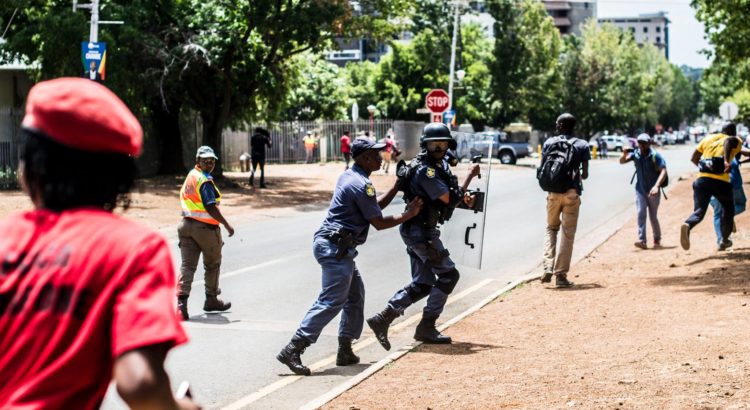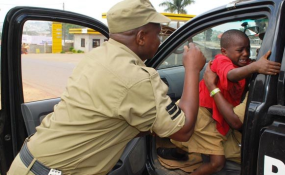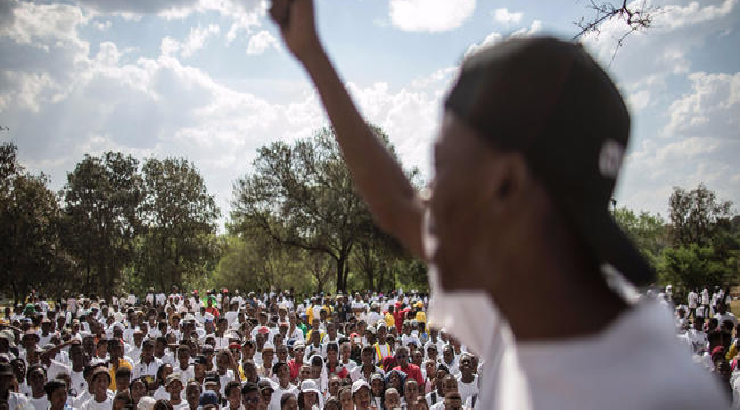Suth African/03 de Octubre de 2016/Los Ángeles Time
Resumen: Suth African se encuentra bajo guardias de seguridad una de las principales universidades de ese continente. La policía disparan balas de goma a los estudiantes. Vicerrectores advierten que los estudiantes podrían no ser capaces de terminar el año académico si la controversia nacional sobre la financiación de la educación superior no se resuelve pronto.
Suth African protesters lob rocks at security guards at one of the continent’s leading universities. Police fire rubber bullets at students on another campus. Vice chancellors warn that students might not be able to finish the academic year if a national dispute over financing higher education is not resolved soon.
Twenty-two years after the end of white minority rule, grievances over economic inequities are fueling unrest that has forced the closure of some of South Africa’s most prominent universities, which are struggling to cover costs. Opinion has splintered among students, faculty, parents and the government, which acknowledges funding shortfalls but accuses a radical minority of bringing campuses to a standstill.
One target of protesters’ condemnation is Adam Habib, vice chancellor of the University of the Witwatersrand in Johannesburg, also known as Wits. Habib, in turn, has suggested it is ironic that Wits, whose student population is mostly black, could unravel because of protesters who say they are committed to “decolonization.”
He tweeted: “The tragedy of our moment.”
The protests are smaller than widely popular demonstrations in 2015 that forced the government to suspend university fee increases this year. Demonstrations picked up again after the government said universities can increase fees by up to 8% next year, although it will pay about $180 million to cover the costs of poor students in 2017.
Wits and the University of Cape Town hope to resume the academic program on Monday. Some students vehemently oppose that plan.
Once a student demand for free education is met, “we are willing to go back to class. I mean, we are here because we want to study and get degrees,” said Mzwanele Ntshwanti, a student leader at Wits who wore a jacket with an emblem of the Student Representative Council.
“We’ve managed to disrupt the system because that’s the only language that they understand,” he said Friday.
Ntshwanti was standing outside the Great Hall, a temple-like building whose tall columns evoke Western academic traditions that irk some South African students who demand a curriculum more focused on African affairs. As he spoke, about 100 members of the Wits teaching staff, many in red and black academic robes, rallied on the Great Hall steps to demand more state funding and an end to violence.
“No cops on campus!” read a placard. About 10 police vehicles were stationed on a nearby campus road and in a parking lot beside the Origins Center, a university museum that explores human evolution.
On Sept. 20, protesters at Wits threw stones at private security guards, smashing glass at the Great Hall entrance. Some guards picked up projectiles and threw them back, contributing to an image of a prestigious center of learning as a chaotic battleground. In a separate incident, the government blamed student activists for the death of a university worker who was hospitalized after being affected by a fire extinguisher sprayed by protesters.
Wits is charging between $2,200 and $4,200 for tuition for a first-year undergraduate in 2016. In addition, there are book, travel and lodging costs. The government says it will pay tuition for students from households with up to $43,700 in annual income, a measure expected to benefit about 80% of undergraduates.
On Wednesday, police fired rubber bullets and arrested 11 students during a protest for free education at Rhodes University in the city of Grahamstown. That prompted the vice chancellor, Sizwe Mabizela, to say students should not become “collateral damage” in the dispute over costs.
Vice Chancellor Max Price of the University of Cape Town on Friday met 200 protesters who oppose the university’s reopening on Monday. Separately, about 2,000 students and staff members, some holding books, held a silent rally urging the resumption of classes, Price said on the university’s website.
“There’s a lot of uncertainty. There are a lot of different political positions and views on campus,” said Mehita Iqani, an associate professor of media studies at Wits.
There are also expectations of more violence. Wits Vuvuzela, a university newspaper, advises students on how to respond to stun grenades, rubber bullets and tear gas in a section titled: “What to expect from the police and how to stay safe.”
Around the corner from the Great Hall at Wits is a piece of graffiti with instructions. It starts: “How to make a petrol bomb: a guide for students.”
Fuente: http://www.latimes.com/world/la-fg-south-africa-universities-20161001-snap-story.html










 Users Today : 9
Users Today : 9 Total Users : 35460140
Total Users : 35460140 Views Today : 13
Views Today : 13 Total views : 3418796
Total views : 3418796